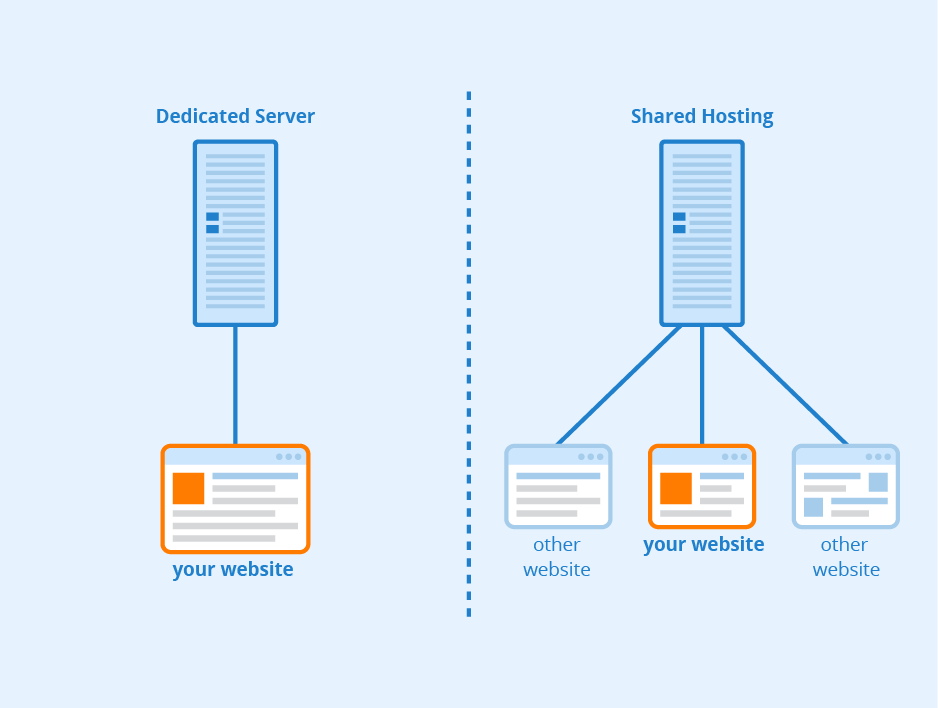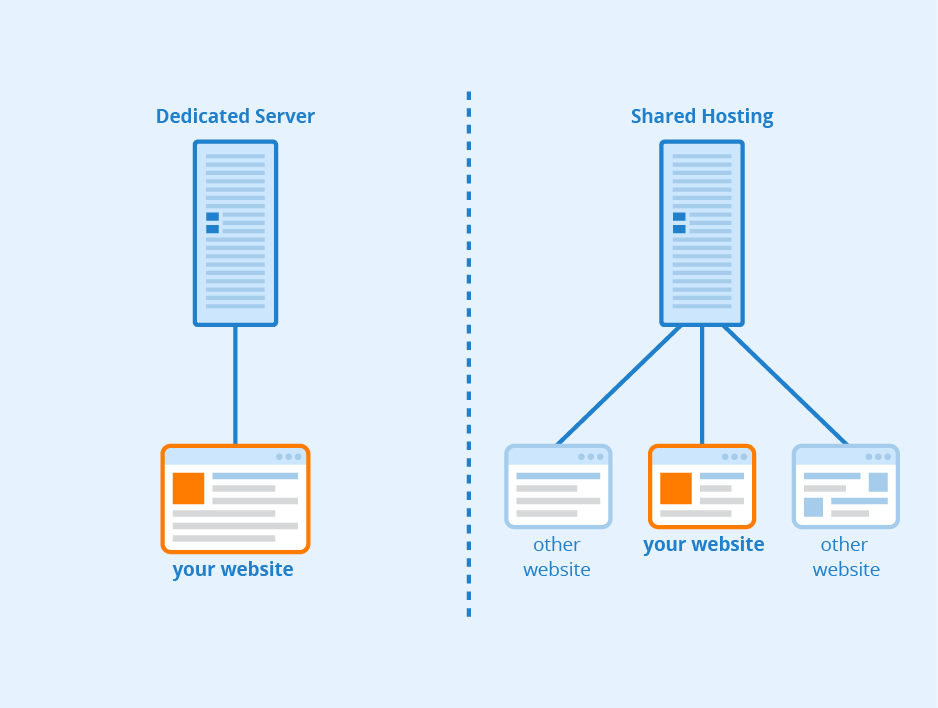Shared web hosting is a popular choice for many businesses and individuals looking to establish an online presence. With shared web hosting, multiple websites are hosted on a single server, sharing its resources and costs. This cost-effective solution allows individuals and small businesses to get their websites up and running without the need for extensive technical knowledge or a large budget.
Shared web hosting offers a range of benefits including affordability, simplicity, and scalability. By sharing server resources, it keeps costs down, making it an ideal choice for those on a budget. Additionally, shared web hosting providers typically offer user-friendly interfaces and support, making it easy for individuals without technical expertise to set up and manage their websites. Furthermore, as their websites grow, users have the option to upgrade their hosting plan to accommodate increased traffic and resource requirements. This flexibility makes shared web hosting a convenient and practical choice for a wide range of users.
Shared web hosting is a type of hosting where multiple websites are hosted on a single server. It is a cost-effective solution for small to medium-sized businesses that don’t require dedicated resources. With shared hosting, resources such as CPU, RAM, and disk space are shared among the websites on the server. While it may not offer the same level of performance as dedicated hosting, it is a great option for beginners or those with limited budget and technical expertise.

The Basics of Shared Web Hosting
Shared web hosting is a popular and cost-effective option for hosting websites. In this type of hosting, multiple websites are hosted on a single server, sharing its resources such as CPU, RAM, and disk space. It is like renting a small portion of a larger apartment building, where each tenant has their own space and resources, but they share common areas and facilities.
In shared web hosting, the hosting provider manages the server and takes care of any technical issues, security, and server maintenance. This allows website owners to focus on their content and online presence without having to worry about server management. It is an ideal solution for websites with low to moderate traffic, small businesses, personal blogs, and portfolio websites.
Shared web hosting offers several advantages. Firstly, it is affordable as the costs of maintaining and managing the server are divided among multiple users. This makes it an economical choice for those who don’t want to invest in a dedicated server. Additionally, shared hosting is user-friendly, making it accessible even for individuals without technical expertise. The hosting provider handles the server administration, software updates, and security measures, easing the burden for website owners.
However, there are some limitations to shared web hosting. Since multiple websites are sharing the same resources, the performance and speed of the server can be affected if one website experiences a sudden surge in traffic or consumes a significant amount of resources. This is known as the “bad neighbor effect.” Additionally, shared hosting may have certain restrictions such as limited storage space, bandwidth, and database limitations. These limitations may impact the scalability and performance of websites with high traffic or resource-intensive applications.
Making money online is a common goal for website owners, and shared web hosting can play a role in achieving this. With its affordability and easy setup, it allows individuals and small businesses to establish an online presence without breaking the bank. However, it’s important to consider the limitations and ensure that the chosen shared hosting plan can support the required functionality and performance for monetizing the website.
Benefits of Shared Web Hosting
Shared web hosting offers numerous benefits that make it an attractive option for many website owners. Let’s explore some of these advantages in detail:
1. Cost-Effectiveness
Shared hosting is budget-friendly, making it an ideal choice for individuals and small businesses. The cost of server maintenance and management is divided among multiple users, resulting in lower costs for each website owner. This allows website owners to allocate their resources to other essential aspects of their online presence, such as marketing or content creation.
The affordable nature of shared hosting makes it an excellent option for those who are just starting their online journey and want to test the waters without making a significant financial investment. It provides a cost-effective solution for establishing an online presence before potentially upgrading to a more advanced hosting plan as the website grows.
2. User-Friendly Interface
Shared hosting is designed to be user-friendly, enabling individuals without technical expertise to manage their websites easily. The hosting provider takes care of the server administration, software updates, and security measures, allowing website owners to focus on creating and uploading content.
Most shared hosting providers offer user-friendly interfaces and control panels, such as cPanel or Plesk, that simplify website management tasks. These control panels provide intuitive interfaces for managing domains, email accounts, databases, and website files. They also offer one-click installations of popular CMS platforms like WordPress, making it even more accessible for beginners.
3. Technical Support and Maintenance
Shared hosting plans typically include technical support from the hosting provider. This means that if website owners encounter any technical issues or have questions, they can rely on the support team to assist them. The support services are usually available 24/7 via various communication channels such as live chat, email, or phone.
Additionally, shared hosting providers handle server maintenance, security updates, and backups, ensuring that the websites hosted on their servers are secure and up-to-date. This eliminates the need for website owners to worry about server management and allows them to focus on their core business or content creation.
4. Resource Scalability
Shared hosting plans generally offer scalable resources, allowing website owners to upgrade or downgrade their plans based on their needs. This flexibility is especially beneficial for websites that experience fluctuations in traffic or have seasonal spikes in demand.
As a website grows in terms of traffic and resource requirements, shared hosting plans can accommodate these changes by providing additional resources or offering the option to upgrade to a more advanced hosting plan. This ensures that websites have the necessary resources to deliver a smooth user experience without the need to switch to a different hosting environment.
Considerations for Shared Web Hosting
While shared web hosting offers several benefits, there are a few considerations to keep in mind when choosing a shared hosting plan:
1. Limited Resources
Shared hosting plans have limitations on resources such as storage space, bandwidth, and database usage. These limitations can affect the scalability and performance of websites with high traffic or resource-intensive applications.
It’s essential to evaluate the specific resource requirements of the website and ensure that the chosen shared hosting plan can accommodate those needs. Being aware of the limitations and resource usage guidelines can help avoid potential issues in the future.
2. Performance and Speed
Since multiple websites share the same server resources in shared hosting, the performance and speed of the server can be impacted by the activities of other websites sharing the server. If one website experiences a sudden surge in traffic or consumes a significant amount of resources, it can affect the overall performance of the server and, subsequently, the other websites.
To mitigate the impact of the “bad neighbor effect,” it’s crucial to choose a reputable hosting provider that actively monitors server performance and takes measures to ensure a fair distribution of resources among the websites hosted on their servers.
3. Security Considerations
Shared hosting environments have a higher risk of security vulnerabilities compared to dedicated or VPS hosting. If one website on the shared server is compromised, there is a possibility that other websites hosted on the same server may also be affected.
It’s crucial to choose a hosting provider that prioritizes security and implements measures such as regular server updates, malware scanning, and firewall protection. Additionally, website owners should also ensure they have implemented adequate security measures on their websites, such as using strong passwords, keeping software up-to-date, and using secure protocols for data transmission.
4. Lack of Full Control
With shared hosting, website owners have limited control over the server environment and software configurations. The hosting provider determines the server software, operating system, and other technical aspects.
While this may not be a concern for those who prefer a hands-off approach to server management, it can be a limitation for those who require specific software versions, modules, or server configurations. In such cases, a dedicated server or VPS hosting may be a more suitable choice.
Conclusion
Shared web hosting is a popular choice for individuals, small businesses, and website owners on a limited budget. It offers an affordable and user-friendly hosting solution, providing the necessary features and support for establishing an online presence. However, it’s important to consider the limitations and ensure that the chosen shared hosting plan aligns with the specific needs of the website.
Click here to explore different shared hosting plans and providers that offer reliable and secure hosting environments for your website.
Key Takeaways
- Shared web hosting allows multiple websites to share the same server resources.
- It is an affordable option for small businesses or individuals looking to host their website.
- Shared hosting may have limitations in terms of performance and customization.
- Security risks can be higher in shared hosting compared to other hosting options.
- It is important to choose a reliable shared hosting provider with good customer support.
Shared web hosting is a type of hosting where multiple websites are hosted on a single server.
This means that the resources like CPU, RAM, and storage are shared among all the websites on that server.
Shared hosting is a cost-effective option for small businesses and individuals as they don’t have to manage or maintain the server themselves.
However, it can have limitations on scalability and performance, as the server’s resources are divided among multiple users.
Overall, shared web hosting is a popular choice for beginners and those with low traffic websites, offering an affordable and easy-to-use hosting solution.

